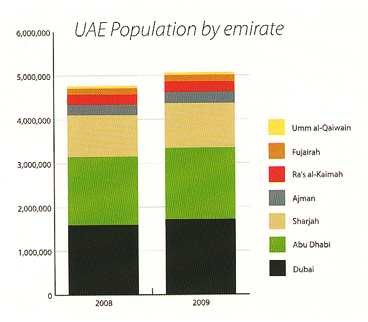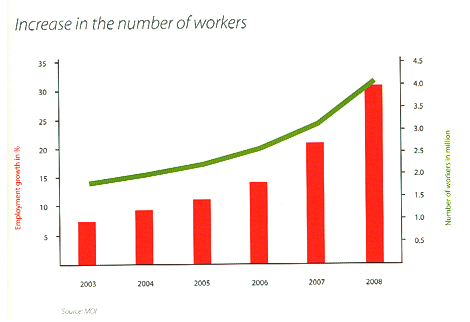|
theuae_left
|
The UAE - People & Society
|
PEOPLE AND SOCIETY |
| |
|
| |
A desire to improve the standard of living of its people and the general well-being of society has driven much government policy – not just in terms of economic development, but also in that of social affairs. In a few shorts years, enormous social changes have taken place in a society that was once largely tribal; it is a remarkable achievement, despite this considerable upheaval, that the UAE is a secure and stable, open and progressive society, renowned for its tolerance, humanity and compassion.
Government efforts to assist society in the process of change have been bolstered by a policy, instituted in 2009, that sermons at Friday prayers throughout the Federation’s mosques must concentrate on the social and educational role of religion and not just on religious dogma. Topics include how to bring up children, women’s rights and the importance of work, lve of country and tolerance.

Government social policy has been effective, as is evidenced by ranking in the UN Human Development Index (HDI), which looks beyond GDP to a broader definition of well-being. Between 1980 and 2007, UAE HDI rose by 0.72 per cent annually, and is today 0.903, up from 0.743. This puts the Federation thirty-fifth out of the 182 countries for which data is available – securing a place for the UAE in the list of countries with a very high human-development score. |
| |
Population
Nevertheless, the Federation’s rapid population growth has brought demographic challenges. At the end of 2009, the population of the UAE was estimated to be 50.6 million, up from 4.76 million in 2008, or an annual growth rate of around 6.3 per cent; the growth rate of the local population was estimated at 3.4 per cent in 2009. However, despite this rapid increase, the UAE has maintained its position as one of the wealthiest nations in terms of GDP per capita income, which was estimated at Dh195,000 (US$53,133.5) at the beginning of 2009; second only to Qatar in the Arab world. |
|
| |
Social Assistance
The family has always been the cornerstone of UAE society. Today, socio-economic issues can challenge even the most committed of family members, and the Government offers support to those in need, particularly the elderly, the disabled and divorces. In addition, a wide array of governmental and non-governmental charitable organizations are involved in social welfare programmes. The UAE Red Crescent Authority, in Particular, is the largest charitable organization in the country, administering comprehensive social, economic, health and educational programmes. Practical help is also offered by social centres run by the General Women’s Union.
The Government is also giving priority to local housing needs and is intent on building communities that have the requisite facilities. Almost 17,000 new villas for Emiratis will be built in Abu Dhabi over the next five years, and 50,000 over the next twenty. Most houses and plots will be given to citizens free of charge. The Sheikh Zayed Housing Programme, funded by the Government to provide housing grants and loans for UAE citizines, also continues to expand its activities throughout the Emirates. |
|
| |
Human Rights
The UAE respects the integrity of every individual residing in the Federation. It commitment to guarantee equality and social justice for all citizens is embodied in the Constitution. The Constitution also outlines the freedoms and rights of all citizens, prohibiting torture, arbitrary arrest and detention, and respecting civil liberties, including freedom of speech and press, peaceful assembly and association, and the practice of religious beliefs.
The Government is firmly committed to promoting, in a constructive way, the principles of the Universal Declaration of Human Rights and is determined to improve its domestic record by bring its own laws and practices up the date. This is in line with the UAE’s cultural heritage and religious values, which enshrine justice, equally and tolerance.
At the international level, the Federation is a signatory of the Convention on the Elimination of Discrimination Against Women, the Convention on the Rights of the Child, the International Labour Organisation Convention on Minimum Age, and the Convention on the Rights of People with Disabilities.
At the national level, the Federation is a signatory of the Convention on the Elimination of Discrimination Against Women, the Convention on the Rights of the Child, the International Labour Organisation Convention of Minimum Age, and the Convention on the Rights of People with Disabilities.
At the national level, governmental strategy focuses on ensuring countrywide sustainable development and initiatives promote the empowerment of women and the development of high-quality education and healthcare systems, as well as the assimilation of members of society with special needs and other vulnerable groups into the development process.
As far as labour issues are concerned, the UAE aims to manage and govern the working environment in line with international laws and best international labour practices. Considerable efforts have been undertaken to ensure the safety of workers, to guarantee payment of wages on time and to improve living and working conditions, as well as to ensure strict enforcement of laws in order to minimize violations.

Gender equality has been on the Government agenda since the Federation’s foundation, and women in the UAE have long been recognized as equal partners is national development. The Government continues to pursue a strategy of empowering women in cultural, social and economic fields. As a result, the UAE is ranked in Thirty-eighth place in the 2009 UN Human Development Report Gender-related Development Index – a Figure that puts it among the highest-ranked nations.
UAE women today participate in all institutions of government, including the executive, legislative and judicial branches, and enjoy a diverse range of careers. In fact, UAE women now constitute 66 per cent of the public-sector workforce, 30 per cent of whom are in senior posts. |
|
| |
Education
All UAE citizens enjoy free universal access to primary, secondary and higher education. In recent years, the education sector has taken on a new significance: its reform and improvement represent a critical step in the Federation’s ongoing development aims, and major efforts are being made across the board to revise curricula and ensure that schools and colleges are properly assessed and accredited.
Special Education is receiving renewed attention, with a focus in 2009 on the integration of national students from a variety of special-needs centres into regular public schools. A new set of standards for public and private schools aims at ensuring that schools comply with this policy, and penalties will be incurred for non-acceptance of children with special needs.
Tertiary-level education in the UAE is also undergoing rapid growth and change. A new Zayed University campus is being built on 75 hectares in the emerging Capital District. The UAE University in Al Ain also has plans for significant expansion, and a new campus is under construction. Other key third-level institutions include the Higher Colleges of Technology, the Etihad training centre, the Emirates Aviation College for Aerospace and Academic Studies, the Emirates Institute for Banking and Finance, and Etisalat’s colleges and university.
Foreign universities, from the Paris Sorbonne to Michigan State University, are very well represented in the UAE. The Abu Dhabi campus of New York University opens in the autumn of 2010. Other important institutions offering a range of specialized courses include INSEAD, the New York Film Academy, The Dubai School of Government, The Petroleum Institute, and the Masdar Institute of Science and Technology. |
|
| |
Health
Healthcare provision in the UAE is universal, and pre-and post-natal care are on a par with the world’s most developed countries. As a consequence, the life expectancy at birth of 78.5 years has reached levels similar to those in Europe and North America.
The introduction of mandatory health insurance in Abu Dhabi for expatriates and their dependants is a major driver in the reform of healthcare policy. In addition, a federal initiative aims to ensure that every Emirati and expatriate in the country will be covered by compulsory health insurance under a unified mandatory scheme.
Healthcare facilities are already of a high standard in the UAE, and, despite the financial climate, health care remains a focus of investment, with a number of government and private projects being undertaken in 2009.
Preventive medicine and public health are considered critical to the long-term well-being of the UAE’s relatively young population. Experts a rise in many lifestyle diseases in coming years. Although cultural barriers are slowly being eroded, they still affect serious issues such as cancer. Compulsory mammograms for women between the ages of forty and sixty and a federal smoking ban in public places are examples of the efforts being made to enhance public health in this regard. The UAE also has very rates of diabetes and cardiovascular disease, and is rolling out strategies to deal with these issues. Primary health care is another crucial tool in public health policy, and smoothing the UAE is working hard to improve.
Public health authorities in 2009 were challenged by the threat of a swine flu (H1N1) pandemic. However, the three major health bodies — the Ministry of Health, the Health Authority – Abu Dhabi and the Dubai Health Authority – switched rapidly and effectively to preventive medicine, crisis management and disease control and an effective plan was put in place to manage the situation. |
|
| |
| Source: UAE2010 Yearbook - UAE National Media Council |
|
|
 |
|
theuae_right
|

